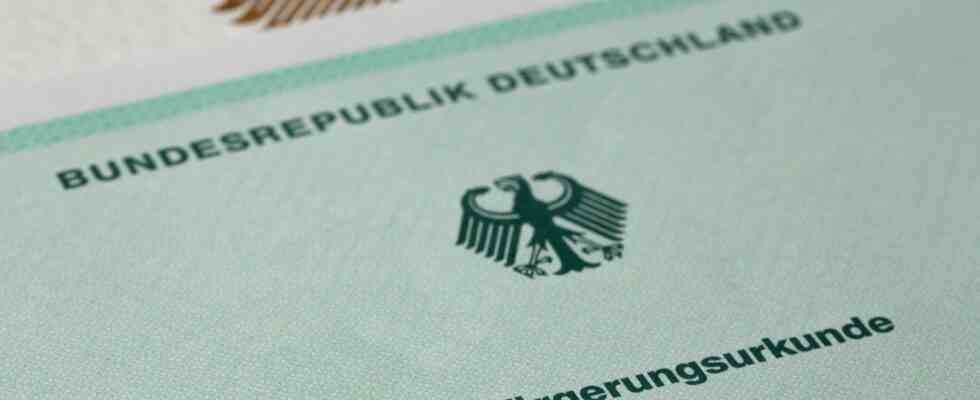FAQ
Status: 11/28/2022 1:03 p.m
The cabinet will discuss new naturalization rules on Wednesday, but there is already a dispute about the Interior Ministry’s plans. Exactly what changes does it envisage?
the initial situation
10.7 million people with foreign nationality live in Germany, 5.7 million of them have been here for at least ten years. The proportion of naturalizations has been at a low level for a long time: only 2.45 percent of the population who have lived in Germany for at least ten years were naturalized in 2021. Compared to other European countries, Germany is in the bottom third. On average, two percent of the population living in the respective country were naturalized in the EU – in Germany only 1.3 percent.
In order to lower the hurdles for naturalization, the Federal Ministry of the Interior wants to change the Citizenship Act. Even before the official political consideration, several politicians commented on the ministry’s draft. Interior Minister Nancy Faeser told the “Tagesspiegel” that the reform was long overdue and “a great opportunity to strengthen our social cohesion”. The federal government’s integration commissioner, Reem Alabali-Radovan, told the newspapers of the Funke media group that Germany wants to become a modern immigration country and that this also includes “that we naturalize faster, better and more”.
The Union criticized the plans – it must continue to apply “first integration, then citizenship,” said CDU General Secretary Mario Czaja of the “Rheinische Post”. Those who do not want to integrate must leave the country again, said FDP faction leader Christian Dürr to the newspapers of the Funke media group.
Which hurdles should be removed specifically?
The deadlines for how long you have to live in Germany in order to be naturalized are to be reduced. It should also be possible to have other citizenships in addition to German. For people over 67, language proficiency tests and the naturalization test are made easier. Instead of some vague formulations, concrete reasons should be laid down when naturalization is excluded.
What new deadlines are planned?
Previously, people had to live in Germany for at least eight years before being naturalized. According to the plans of the Ministry of the Interior, this minimum length of stay is to be reduced to five years. In the case of people who have made special efforts, for example through school or professional achievements, voluntary work or particularly good language skills, the period can even be reduced to three years.
Children of people with foreign passports should receive the citizenship of their parents as well as German citizenship without reservation if the relevant parent has been in Germany for five years. Previously, the deadline was eight years.
Why should multiple citizenships be possible?
The Interior Ministry’s draft stipulates that the principle of avoiding multiple nationalities will be abandoned. This means that people no longer have to give up their citizenship of another country in order to obtain German citizenship. This is intended to simplify and speed up the naturalization process.
“For more than 15 years now, more than half of all naturalizations have been granted with the acceptance of multiple nationalities,” says the draft. The trend is continuously increasing, with 59.3 percent of naturalizations in 2018 compared to 69 percent in 2021. This is also due to compensation naturalizations or late resettlers.
Multinationality will probably lead to more people being encouraged to apply for German citizenship, migration expert Petra Bendel said in an interview tagesschau.de. “Research results show that the condition of giving up one’s previous citizenship when naturalizing is a major hurdle,” said Bendel.
Why are there special rules for older people?
Easier naturalization requirements should apply to people over the age of 67 – for example, they only have to show in an oral language test that they can communicate in German in everyday life without any problems. You no longer have to take a naturalization test. The aim is to honor the “lifetime achievements of the so-called guest worker generation”, according to the draft. You have made a significant contribution to economic and social development.
“Since the so-called guest workers were initially only supposed to stay in Germany temporarily for work purposes, they have received little or no integration offers – such as language support or integration courses – in the past,” says the draft.
More than two-thirds of those over 67 without German citizenship have been in Germany for more than 25 years, and the average length of stay is 31 years, says migration expert Bendel.
What’s next?
The draft that has now become known is a draft bill by the Federal Ministry of the Interior. Its content is revised several times. Then the cabinet discusses it and votes – i.e. all ministers involved in the government under the direction of the Federal Chancellor. It then becomes the formal government draft, which can only then be discussed in the Bundestag.
Charged debate about naturalization
Sabine Henkel, ARD Berlin, November 28, 2022 12:31 p.m

